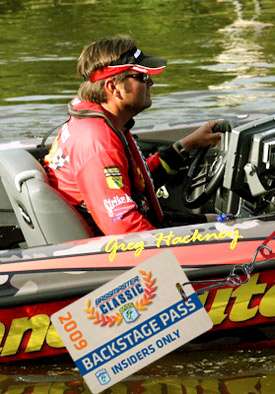
Editor's Note: Seven-time Bassmaster Classic qualifier and Louisiana resident Greg Hackney has agreed to allow us to follow along with him as he prepares for the 2009 Bassmaster Classic.
In Part 1 we'll get his early impressions of the Red River and the factors affecting this year's Classic. In Part 2 we'll take a close look at his tackle and equipment, and in Part 3 we'll get his last-minute thoughts about the Red River and what it'll take to win.
Part 1: Early Impressions
In two short weeks 51 of the best bass anglers on the planet will launch from the Red River South Marina near Shreveport, La., in search of the most coveted title in sportfishing — Bassmaster Classic champion. Greg Hackney will be among them. And by most accounts he'll be in that small group of anglers worth watching — the ones with a realistic chance to win.
"I'd say the weather is the most important thing facing us right now. That's the only thing I'm concentrating on at this point. It's going to affect everything from where we find the bass, to how we catch them, to who catches them, to how many of them we catch," he says. "It'll control everything about this Classic."
He explains those remarks by pointing to what he found during his late November and early December scouting trip.
"The fish were in a transition mode between fall and winter. I found lots of deeper holes and breaks off the main river that were holding both baitfish and bass. If the weather holds like it is now, they'll most likely be in the same places.
"It'll be more of a winter tournament than a true prespawn tournament. They're harder to find and catch when they're like that, so the number of anglers in the hunt will be smaller. That doesn't mean the top weights will go down, though. It just means fewer anglers will have an opportunity to win."
According to the long-range weather forecast, that's most likely what's going to happen. Predictions for the next 10 days show nights in the 40-degree range with daytime highs in the 60s.
But, we all know about weather forecasts, and if it warms the week before the Classic the game will change and change quickly. Hackney says that'll start the bass moving and create more predictable fishing patterns for the competitors.
"This is a shallow river system. It won't take much warm weather to warm the water, especially the backwater areas. That will trigger the spawning instinct and cause the bass to move along easily identifiable prespawn routes — ditches, depressions and creeks or small inflows.
"That'll make them easier to pattern and will put a lot more guys in the hunt. It'll make for an exciting Sunday, but I don't think it'll have much of an effect on the best weights. Like I said before, the top weights will be strong no matter the weather.
"This is a great fishery and these guys are the best of the best when it comes to catching bass. The guys at the top will have heavy sacks all three days. In fact, I'll go so far as to predict it'll take an 8-pounder every day to make big bass, and it might take one bigger than that."
And then there's the rain.
"At this time of year there's very little vegetation along the bank and up in the creeks. Whatever rain comes down is likely to pick up mud and carry it directly into the river. If we get heavy rain, it's a new ballgame. The river will go cold and red in a matter of hours.
"Cold, muddy water winter bass are tough. They can be hard to find and even harder to make bite. That's not a good combination … unless you like it tough."
Hackney's "unless you like it tough" is code for that's exactly what this Classic competitor would like to see when he launches his boat. In Hackney's world, high, cold, muddy water along with low air temperatures, wind, rain and maybe even a little ice is perfect weather for a bass tournament.
"The tougher it is, the better I like it. Nasty water and nasty weather is my kind of fishing. I think maybe it's easier to sneak up on the fish. They don't have so many options. If they're going to eat, they have to eat my lure. I like it when they don't have options.
"I'll fish all day for five bites. That's all I want — five good bites on Friday, five more on Saturday and another five come Sunday."
